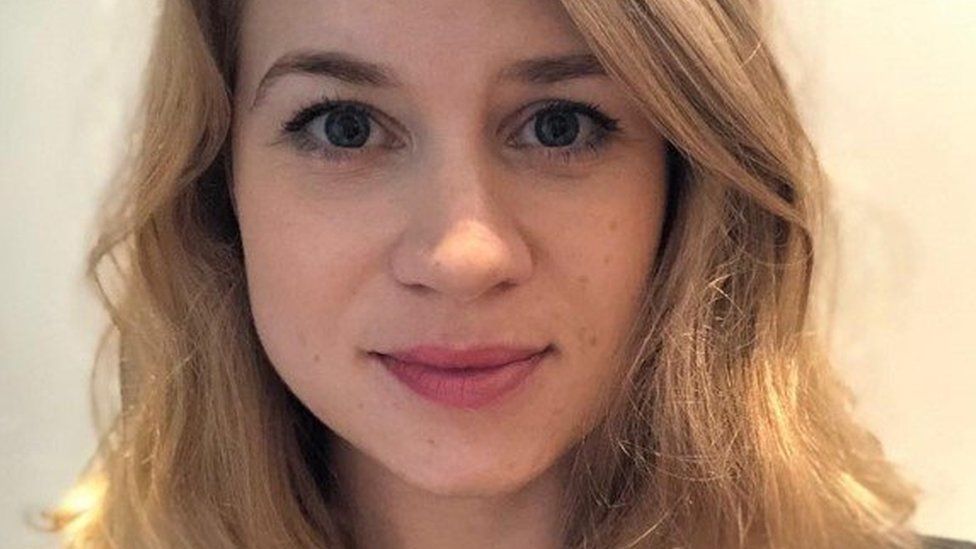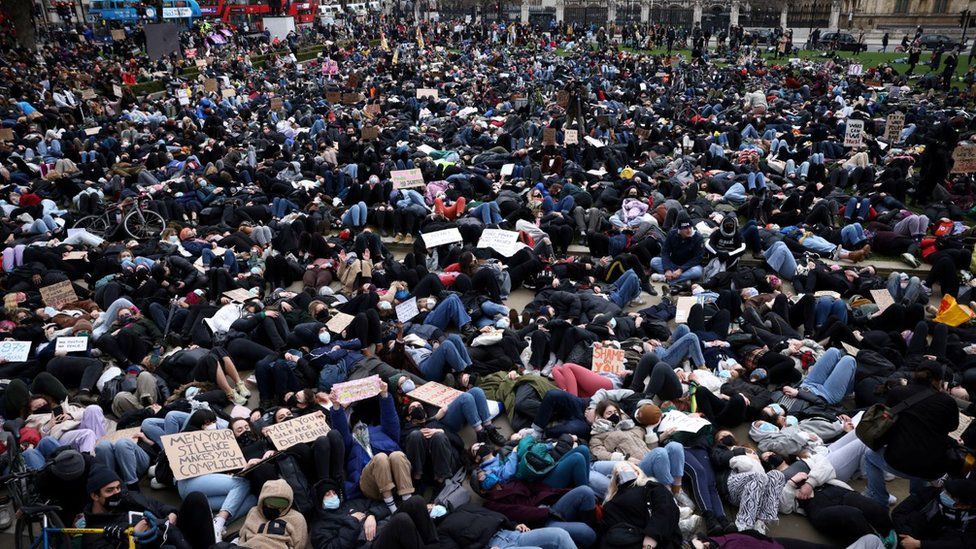Sarah Everard vigil: Women must feel 'properly heard', says PM
Women must feel their complaints about violence are "properly heard", the PM has said, after concern about how a vigil for Sarah Everard was policed.
Boris Johnson said footage of officers forcibly removing a number of women from the event was "distressing".
He added it was "fundamental" that women felt listened to and he was "going to make sure that happens".
Asked if he still had confidence in Met Police Commissioner Dame Cressida Dick, Mr Johnson said: "Yes I do."
"The reality is that the country is united still in shock and grief about what happened to Sarah Everard and we must do everything we can to find the answers," Mr Johnson said.
"I think the fundamental issue that we have to address as a country, and as a society and as a government is that ... women in particular must feel that when they make serious complaints about violence, about assault, that they are properly heard.
"We are going to make sure that that happens."
The prime minister's comments come after criticism that a new policing bill does not go far enough to address violence against women and girls.
The Police, Crime, Sentencing and Courts Bill will be debated by MPs later.
Ms Everard went missing while walking home from a friend's house on 3 March.
Her body was later found in woodland in Kent and Met Police officer Wayne Couzens, 48, has been charged with the 33-year-old's kidnap and murder.
Hundreds gathered on London's Clapham Common on Saturday to lay flowers and pay their respects to Ms Everard.
But officers later handcuffed and removed a number of women from the gathering, arresting four people for public order and Covid offences.
The Met has faced widespread criticism for its handling of the event - but Dame Cressida has rejected a call to step down.
 image copyrightPA Media
image copyrightPA MediaOn Sunday, she said she agreed on the need for a "sober review" but defended how officers responded to the "really big crowd".
"They have to make these really difficult calls and I don't think anybody should be sitting back in an armchair and saying, 'Well that was done badly,' or, 'I would have done it differently,' without actually understanding what was going through their minds," she said.
Home Secretary Priti Patel has instructed the police watchdog, Her Majesty's Inspectorate of Constabulary, to conduct a review of the policing of the event.
Asked on Monday whether he thought Dame Cressida should continue in her role, Mr Johnson said: "Yes I do. And what she's asked is... that we look at what happened on Saturday night.
"The police do have a very, very difficult job. But there's no question that the scenes that we saw were very distressing and so it is right that Tom Winsor, the inspector of constabulary, should do a full report into it."
Dame Vera Baird - the victims' commissioner for England and Wales - said the focus must now return to women's experience of sexual harassment and violence rather than the police's handling of Saturday's vigil.Dame Vera told the BBC: "Let's return to the issue, which is why is it that this number of women, when this awful event [Sarah Everard's death] has occurred, have started to talk about their appalling experiences."They regard, quite clearly, the streets as lawless for women when it comes to male behaviour. Men it seems, they tell us, they can do what they want and say what they want, and nobody will take action."

Louise McLoughlin was one of those at the vigil on Saturday. She told BBC Breakfast it was "a really lovely scene" when she arrived at around 18:00 GMT, but "it started to get a bit more riled" around half an hour later.
"The decision was obviously made for [the police] to move in and take over the area," she said.
"At that point, it became a bit of a push and pull and there were a few scuffles and all of the candles and glass and the signs and the flowers that would have been put down for Sarah, you could just hear the breaking of glass now and again as these things were trampled on."
'We were silenced'
One of the women arrested, Dania Al'Obeid, said she knew the vigil had been cancelled but she still "needed to go and pay my respects".
She told Radio 4's Today programme: "I think that is where the frustration was, the bigger picture here was lost - we felt like we were silenced."
Sir Peter Fahy, former chief constable for Greater Manchester Police, said HMIC had previously criticised police for not intervening enough in Black Lives Matter protests and that many officers felt they were "damned if they do and damned if they don't".
He added that current techniques for removing people from events safely "means that they normally have about five officers - one on each limb and one holding the head".
"The trouble is, when you photograph that, it then looks very heavy-handed," he said.
Ahead of the event, organisers Reclaim These Streets had called off the vigil, saying police had failed to "constructively engage" on how it could be held in a Covid-secure way. When people gathered anyway, the group pointed out that they did so without the marshalling and other safety measures that had been originally proposed.
On Sunday, there were protests outside the Met Police's headquarters at New Scotland Yard, Downing Street and in Parliament Square.
 image copyrightReuters
image copyrightReuters
What are the rules on gatherings in England?
- Under the current lockdown rules two people can meet for recreation outside, which can include "coffee on a bench"
- From 29 March people will be allowed to meet outdoors, either with one other household or within the "rule of six"
- Police can break up illegal gatherings and issue fines of £10,000 to someone holding a gathering of more than 30 people
- During last year's restrictions, when Black Lives Matter and anti-lockdown demonstrations took place, police took a hands-off approach to protests





No comments